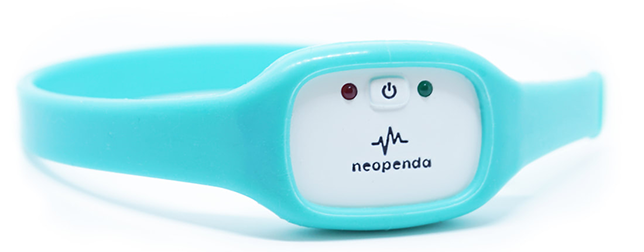Neopenda, a Chicago-based health tech startup has recently unveiled its first product, a wearable device that monitors vital signs of newborns. Almost 3 million babies die within the first month of their birth, according to the company. Vast majority of these deaths (98 percent) occur in developing countries, and in many cases these tragedies could be prevented, the company said.
Read more Baby Sock Monitor Firm Owlet Raises $24 Million in Series B Funding
“Reducing newborn mortality is a really large global issue right now, because nearly 3 million newborns are dying from preventable causes and 80% of those deaths are actually preventable,” says Neopenda CEO and co-founder Sona Shah.
Shah told Medgadget she became really interested in the intersection of engineering, healthcare, and international development after spending a few months in western Kenya and subsequently in R&D at a pharma company. So she decided to pursue an MS in Biomedical Engineering at Columbia University to follow her passion.
In many developing countries, a lack of resources cause understaffing and insufficient healthcare equipment. This means that healthcare personnel find it difficult, and in some cases impossible to properly monitor sick newborns to evaluate if they need treatment.
Neopenda decided to address this issue by developing a wearable baby monitor that can continuously monitor vital signs such as heart rate, respiratory rate, temperature, and blood oxygen saturation. The device relays this information via Bluetooth, and the vital signs are displayed by an app in real time. Healthcare personnel are alerted when vitals go outside the healthy range.
“We had the unique opportunity to travel to Uganda to conduct a needs assessment, and found that there was such a scarcity of functional medical equipment in so many of the hospital wards – primarily because the commercially available products did not meet the design constraints of low-resource hospitals. After the trip, Teresa and I decided to start Neopenda to engineer medical devices for where they are needed most,” Shah said.
Over-burdened nurses are aided by this centralized system which helps them to better manage and provide high quality care to their patients, said Teresa Cauvel, Neopenda CTO. “It improves speed of action for newborns in distress, and they have the best chance to receive the care they need to survive and thrive. The devices are reusable, designed for ruggedness and ease of cleaning, and are rechargeable with a battery life of several days,” Cauvel said.
Read more Update on Baby Wearables
The device is affordable and easy to maintain. The company is working to develop a total solution that includes local training, maintenance, and product support.
Shah said they have ideas to expand this vital signs monitor to other patient populations. “At this stage we remain focused on getting our neonatal vital signs monitor to the vulnerable newborns we can help most,” she said.













